If you like board games about economy and industry or are searching for games that dwell into the mechanics of supply and demand, trading, money, production and distribution of goods, check out these highly recommended and rated picks.
Games about economy typically involve thinking and planning. They are also educational and can help you teach students or teenagers about economics, manufacturing and industry.
Brass Birmingham
Suitable for 2 – 4 players | 60 – 120 mins duration | Recommended age 14+ | Game complexity: EASY
Genre: Economic,Industry,Transportation Solo game mode: No Co-op: No
Online Version: No
Click here for the official rulebook
No products found.
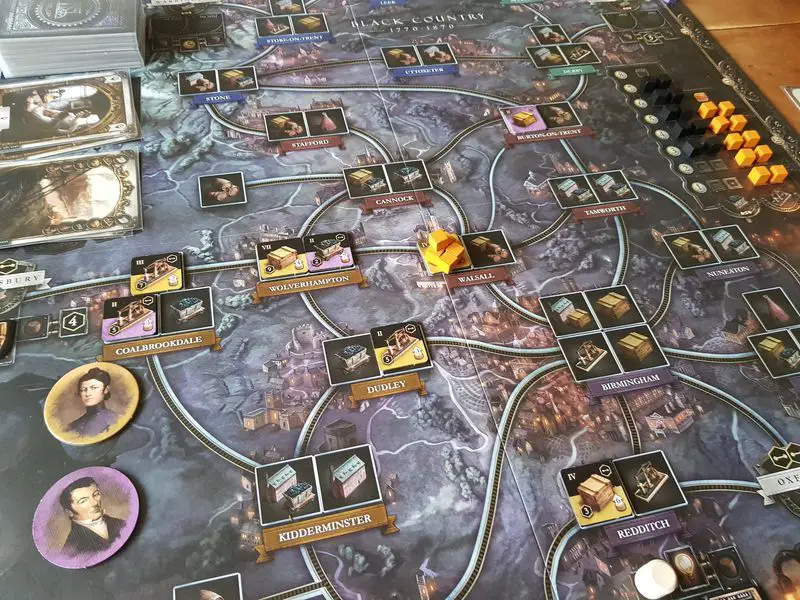
Brass Birmingham: A Strategic Deep-Dive into the World of Industrial Revolution Gaming
If you’re into strategy and economic development-themed board games, Brass Birmingham might just be the game you’re looking for. This game is set against the backdrop of a fledgling English megalopolis during the early days of the Industrial Revolution.
Brass Birmingham, a standalone sequel to the original Brass, was created by the masterminds at Roxley Games and released in 2018. It’s a name that resonates within the niche community of enthusiasts who revel in the complexities of economic and historical simulation gaming. The game is a thematic descendant of the rise of industry in Birmingham during the 18th and 19th centuries.
Delving into the Gameplay of Brass Birmingham
Brass Birmingham is markedly different from traditional “roll and move” board games. Instead, it offers a hand management, network and industry building, economic masterpiece that typically plays out over two halves of a century game-world time. Players take on the roles of entrepreneurs during the industrial revolution, competing to build the most successful network of industries in the West Midlands.
The game is split into two different eras, the canal phase, and the rail phase, each demanding specialized approaches. Throughout these eras, the primary goal is to amass victory points, achieved through the sale of manufactured goods, building canals and railroads, investing in the growing market, and smartly managing available capital.
Notably, Brass Birmingham implements a unique mechanic where players’ strategies are not only about what they build but also about when they choose to close locations to gain end-of-game victory points. This adds a fascinating element of timing and strategic foresight that can make or break your economic empire.
Mastering the Intricate Game Mechanics
The game board for Brass Birmingham is divided into two very different regions — the double-sided determined to represent the canal phase and the rail phase. As you progress through the game, you’ll lay down tiles to build networks, develop industries, and seek to meet the increasingly complex needs of the industrial revolution’s market.
In terms of resources, players must manage various types, including coal, iron, and beer, each serving specific needs in development. Accessibility and cost factors are always in play, requiring a deep consideration of how you will source and deploy these vital assets.
The market is another dynamic aspect, with the price and availability of goods fluctuating in real-time as players take actions, mirroring a competitive, ever-changing economic landscape. This market manipulation isn’t just a neat concept; it’s core to your strategy and success in Brass Birmingham.
Who Will Find It Fun?
Brass Birmingham is not a casual game night choice; it’s an involved, thoughtful, and ultimately rewarding game for those willing to invest time and mental energy. If you enjoy navigating complex rule systems, seeing the fruits of long-term planning, and the satisfaction of a well-timed, strategic move, this game is for you.
Players who relish the historical backdrop that serves as a vibrant canvas for the game will find special enjoyment in the attention to detail and thematic immersion offered by Brass Birmingham. Gamers with a competitive edge will relish the race for industry dominance and the economic warfare that ensues.
For strategy game enthusiasts, the depth of its gameplay is a feast for the mind, presenting challenges and decisions that echo throughout the game’s interwoven systems. Each choice has a far-reaching impact, making every playthrough unique and ripe with emergent gameplay.
Find out moreTwilight Imperium: Fourth Edition
Suitable for 3 – 6 players | 240 – 480 mins duration | Recommended age 14+ | Game complexity: EASY
Genre: Civilization,Economic,Exploration,Negotiation,Political,Science Fiction,Space Exploration,Wargame Solo game mode: No Co-op: No
Online Version: No
Click here for the official rulebook
No products found.
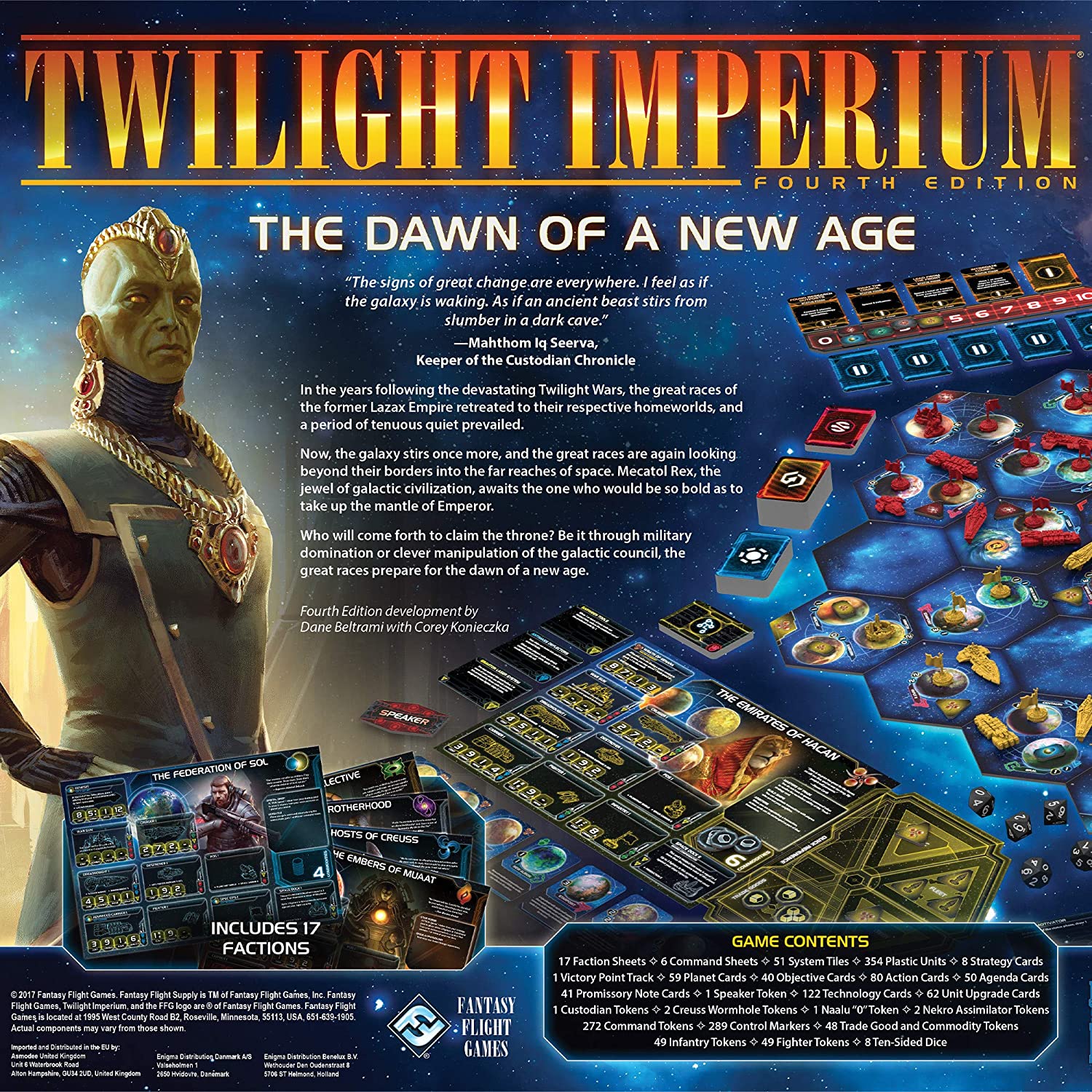
An Introduction to Twilight Imperium
Twilight Imperium is a galatic-themed game that has intricate gameplay and a sprawling game board. If you are willing to invest time and challenge your mental dexterity, Twilight Imperium is one to consider.
A Constellation of Strategy and Storytelling
Twilight Imperium is an all-consuming saga that doesn’t just unfold; it’s crafted by the players themselves.
The allure of Twilight Imperium lies in the fusion of strategy and storytelling as you pilot your chosen race across the galaxy, intent on diplomacy or domination, or perhaps somewhere in between.
Gameplay
The board is a key feature of Twilight Imperium. It begins as a barren expanse, waiting to witness the rise and fall of empires. Nine separate sections, each brimming with planets, asteroids, and other celestial phenomena, are pieced together to form the hexagonal canvas upon which your destiny is charted.
Through the game’s many phases, players will expand and exert their influence through military might, political maneuvering, economic prowess, and the occasional sprinkle of random chaos. Twilight Imperium’s strength lies in the ability to achieve victory through many paths. Its gameplay caters to varied playstyles, accommodating to those who wish to conquer or those who prefer trading.
Game Mechanics
Twilight Imperium excels in its approach to mechanics. Here’s a glimpse at just a few:
Politics: A dynamic political arena affects every player, where laws can be enacted, agendas debated, and declarations of war hurled across the cosmos.
Diplomacy: The intricate web of diplomacy is crucial; forging alliances could mean the difference between a glorious assault and a defensive withdrawal.
Technology: Research and acquire advancements that redefine the capabilities of your empire’s fleets, armies, and infrastructure.
Trade: Establish trade routes to fortify your coffers and bolster economic ties with other civilizations.
Warfare: Engage in epic space battles or planetary invasions, with a strategic depth that demands attention and cunning.
With a turn structure that evolves across the game and impeccable balancing, Twilight Imperium is a sophisticated marvel of design.
What Makes Twilight Imperium Fun?
The fun factor of Twilight Imperium lies in the developing storyline. While other games might offer a sprint to the finish line, Twilight Imperium compels you to savor the voyage. There is the thrill of discovery as new sectors open up and the satisfaction of alliance negotiations The unpredictability of a bustling space governed by a dynamic political system and the elation of achieving goals, whether personal or political, adds to the fun.
Who Will Find It Fun?
Twilight Imperium is not for those looking for a casual gaming experience. It is suited for board game strategists who are comfortable with long-form gameplay.
Find out moreGaia Project
Suitable for 1 – 4 players | 60 – 150 mins duration | Recommended age 12+ | Game complexity: EASY
Genre: Economic,Science Fiction,Space Exploration,Territory Building Solo game mode: Yes Co-op: No
Online Version: No
Click here for the official rulebook
No products found.
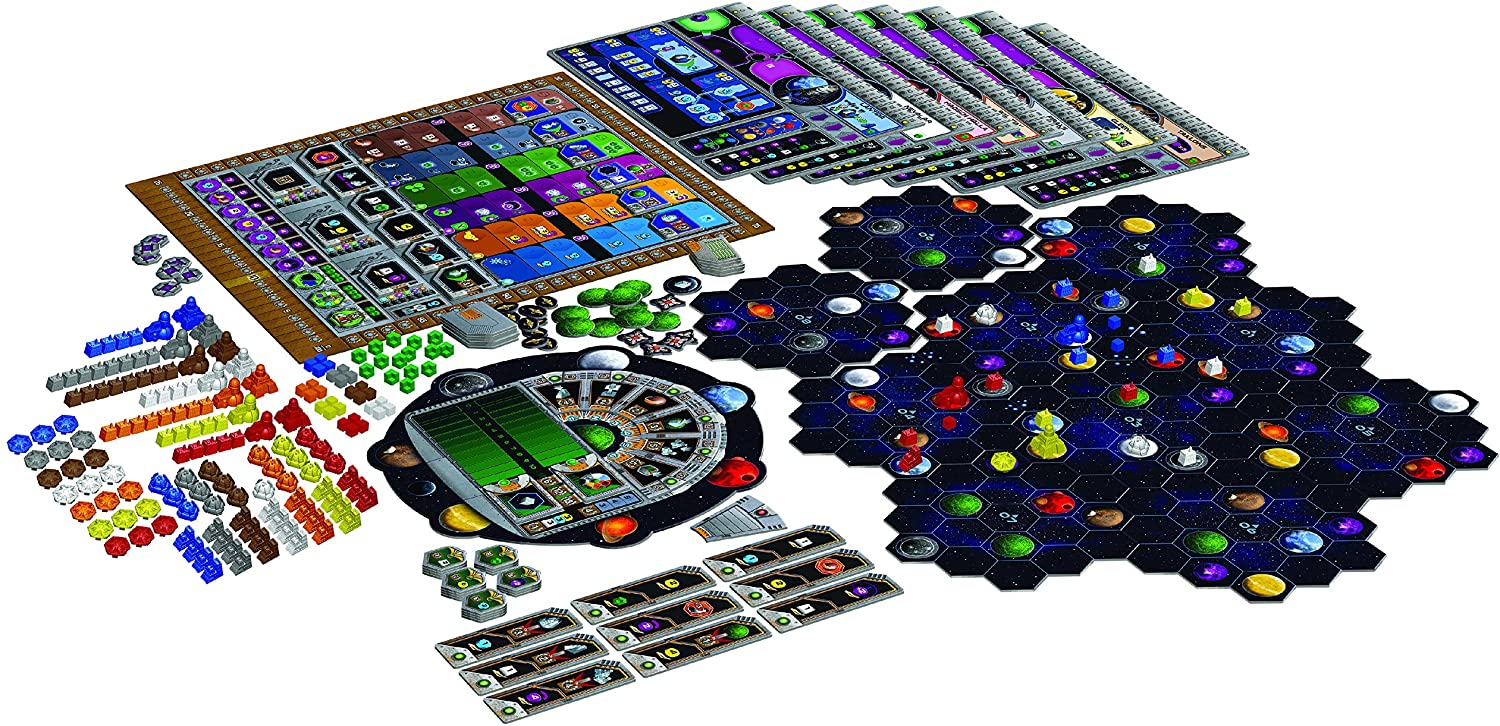
In the board game Gaia Project, fourteen different factions live on seven different kinds of planets, and each faction is bound to their own home planets, so to develop and grow, they must terraform neighboring planets into their home environments in competition with the other groups.
In addition, Gaia planets can be used by all factions for colonization, and Transdimensional planets can be changed into Gaia planets. All factions can improve their skills in six different areas of development — Terraforming, Navigation, Artificial Intelligence, Gaiaforming, Economy, Research — leading to advanced technology and special bonuses.
As you play, you’ll colonize new planets, upgrade mines into better structures, and unite planets into federations. Which will you choose: will you expand near other factions, so you can trade with them, or will you expand on your own, so you can expand more freely? Besides that, you’ll need to learn new technologies to get better.
In the end, only the best will survive and win.
Find out moreMaracaibo
Suitable for 1 – 4 players | 30 – 120 mins duration | Recommended age 12+ | Game complexity: EASY
Genre: Economic,Exploration,Pirates Solo game mode: Yes Co-op: No
Online Version: No
Click here for the official rulebook
No products found.
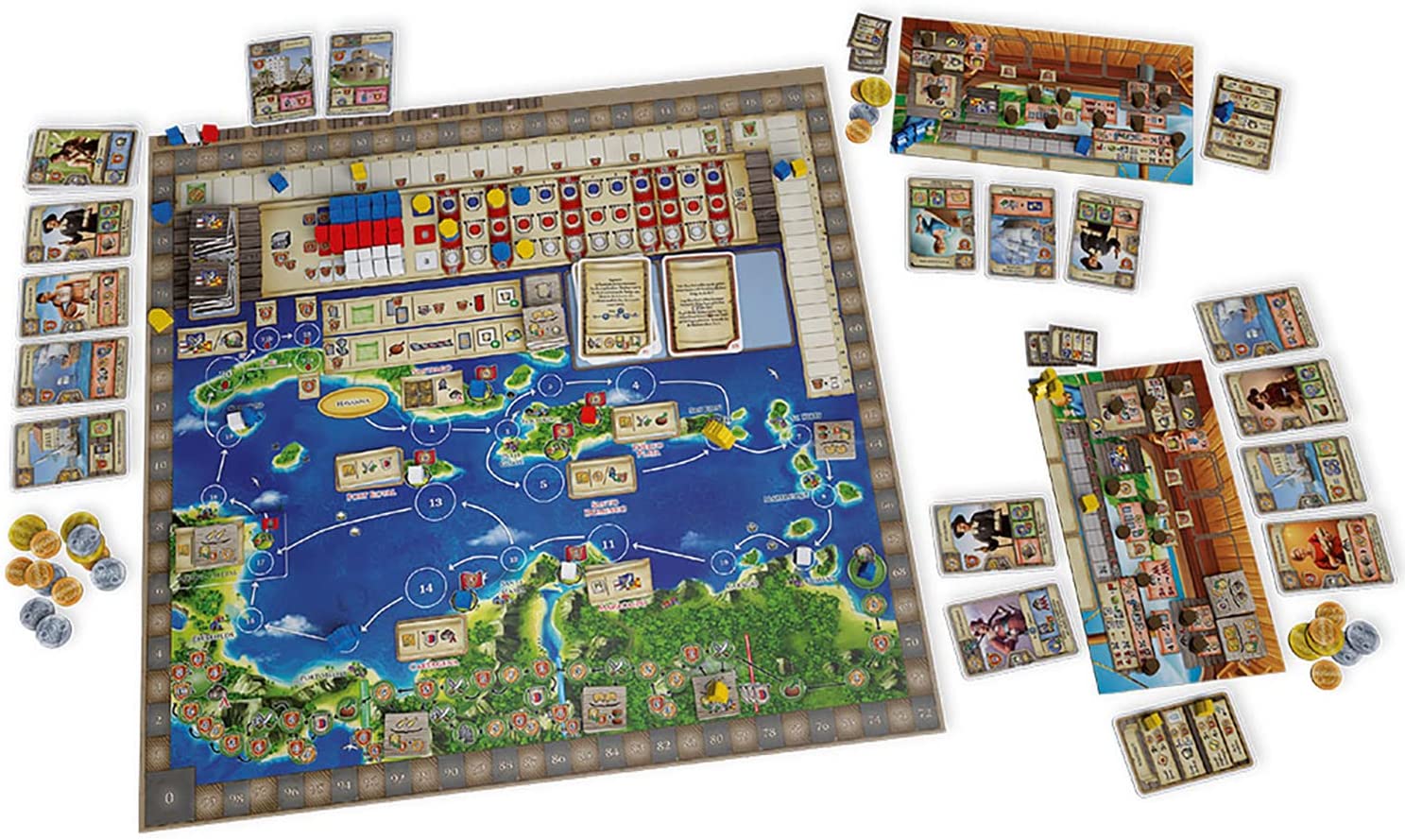
Maracaibo, the new strategy game for 1-4 players by Alexander Pfister, is set in the Caribbean during the 17th century. The players try to increase their influence in three nations in four rounds with a play time of 40 minutes per player. The players sail on a round course through the Caribbean, e.g., you have city tiles where you are able to perform various actions or deliver goods to. One special feature is an implemented quest mode over more and various tiles, which tells the player, who chase after it, a little story. As a player, you move with your ship around the course, managing it by using cards like in other games from Alexander Pfister.
Find out moreKanban EV
Suitable for 1 – 4 players | 60 – 180 mins duration | Recommended age 14+ | Game complexity: EASY
Genre: Economic,Industry Solo game mode: Yes Co-op: No
Online Version: No
No products found.
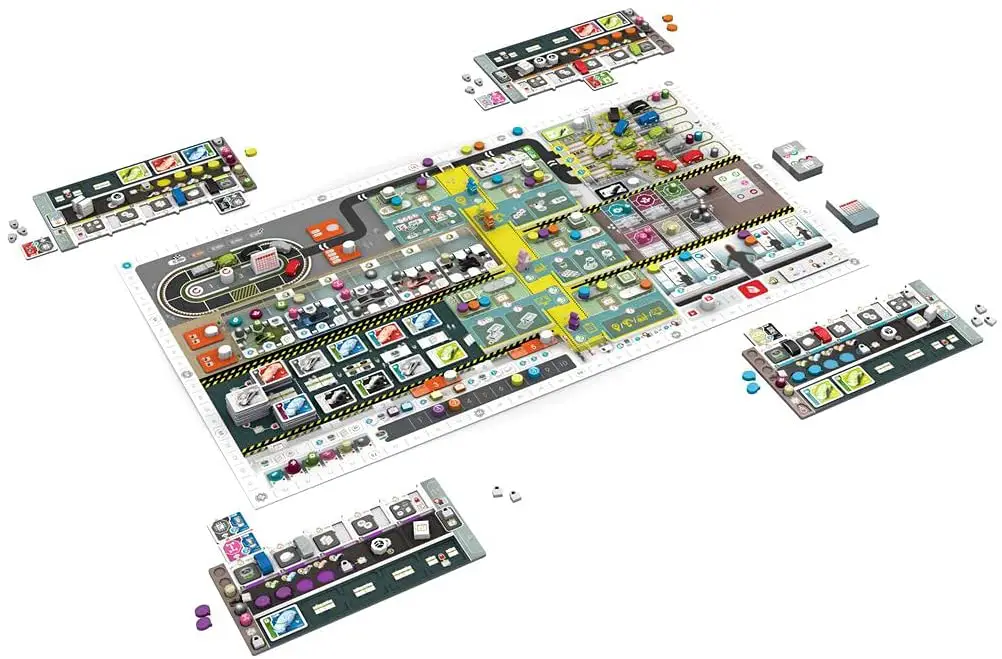
Kanban EV (Electric Vehicles) is a strategy game where players will be overseeing the production of these vehicles. It’s a board game based on the Japanese automotive manufacturing system called “Kanban”
How to Play
In Kanban EV, you are in charge of a car factory and your goal is to produce high-quality cars efficiently. The game is all about managing your production line, optimizing your processes and competing against others to become the best car manufacturer.
But don’t be fooled by its simple premise, Kanban EV has some deep strategic elements that can keep you hooked for hours. The game mechanics are well thought out and there are multiple ways to achieve victory, making it a great choice for players who love a challenge.
Who Can Play
This game appeals to both board game enthusiasts and strategy game lovers. If you love games with resource management, worker placement and engine building mechanics, you will enjoy Kanban EV
What Makes It Fun
What makes the game even more fun is that it’s not just about winning, but also about creating and optimizing your own car factory. The satisfaction of seeing your production line run smoothly and efficiently is truly unbeatable. Plus, with its beautiful artwork and high-quality components, playing Kanban EV just feels luxurious.
Heaven & Ale
Suitable for 2 – 4 players | 60 – 90 mins duration | Recommended age 12+ | Game complexity: MEDIUM
Genre: Economic,Farming,Industry Solo game mode: No Co-op: No
Online Version: No
Click here for the official rulebook
No products found.
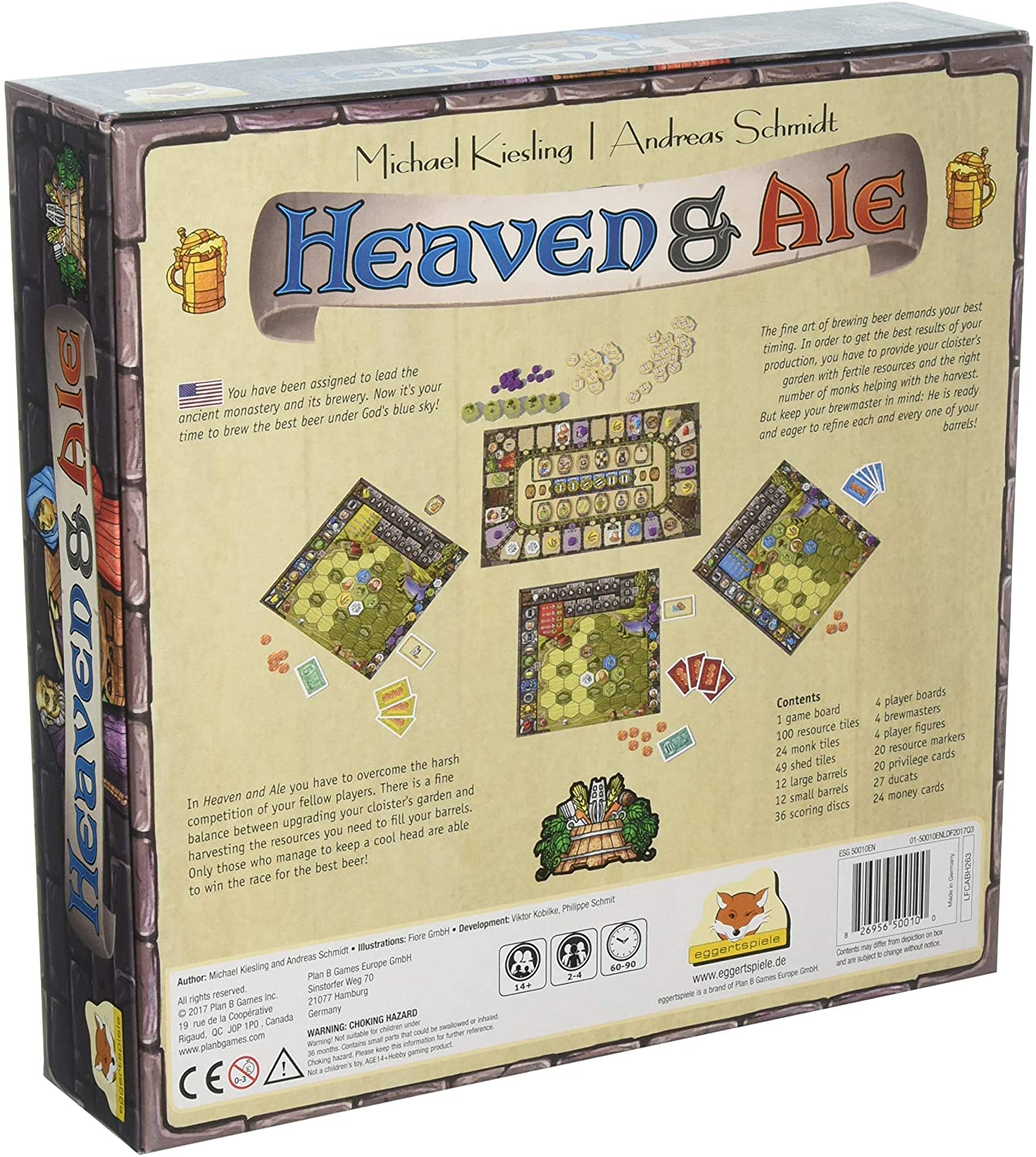
Heaven’s best ale is your goal as the head of an ancient monastery! You compete with your opponents over several rounds for resource tiles and monk tiles to improve your cloister’s garden. You must balance buying new tiles with taking the scoring discs that allow you to reap the benefits. It’s no easy task, as you all go after the same tiles and limited scoring discs. Developing synergies between her resource, monk, and shed tiles is key to winning. In order to win, you must balance your resources and the progress of your brewmaster so that you fill a lot of barrels with good beer by the end of the game.
Find out moreAgricola
Suitable for 1 – 5 players | 30 – 150 mins duration | Recommended age 12+ | Game complexity: MEDIUM
Genre: Animals,Economic,Farming Solo game mode: Yes Co-op: No
Online Version: Yes
Click here for the official rulebook
No products found.
Agricola is a solo or up to 5 player game where players are farmers in a wooden shack with their spouse and little else. Players need to build their farmstead by sowing fields and raising livestock. This game supports many levels of complexity and is a turn-based game. There are 14 game rounds occurring in 6 stages, with a Harvest at the end of each stage. On a turn, players get to take only two actions, one for themselves and one for their spouse, from all the possibilities found on a farm such as collecting clay, wood, or stone; building fences and more. However, each action can only be taken by one player each round, requiring players to choose in order of preference.
Players can choose to have more work accomplished by having kids and use one of their 7 Occupation cards. Players win by scoring more points than their opponent, done so by strategic thinking.
The Godfather: Corleone’s Empire
Suitable for 2 – 5 players | 60 – 90 mins duration | Recommended age 14+ | Game complexity: MEDIUM
Genre: Economic,Mafia,Movies/TV/Radio Theme Solo game mode: No Co-op: No
Online Version: No
No products found.
Find out moreRoll for the Galaxy
Suitable for 2 – 5 players | 45 – 45 mins duration | Recommended age 13+ | Game complexity: MEDIUM
Genre: Civilization,Dice,Economic,Science Fiction,Space Exploration Solo game mode: No Co-op: No
Online Version: No
Click here for the official rulebook
No products found.
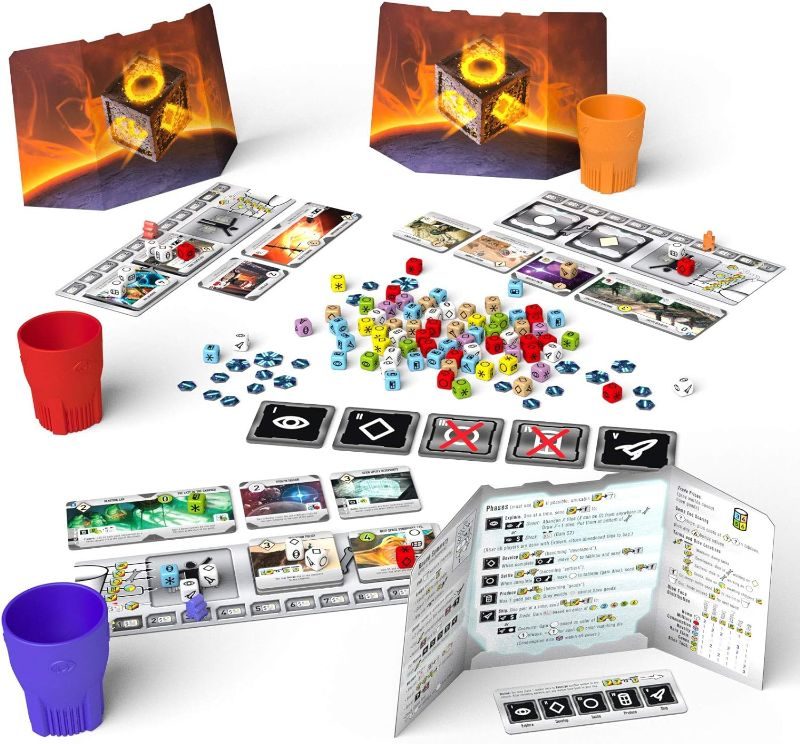
Roll for the Galaxy: A Dice Game Odyssey in Space Strategy
Roll for the Galaxy is a masterful blend of chance and choice, invoking the pioneer spirit of space exploration and economic conquest.
The Game Setup
Roll for the Galaxy, designed by Wei-Hwa Huang and Tom Lehmann, puts you into the roles of space-faring factions seeking to build your intergalactic empire. You start with a dice pool, representing your workers, or ‘dice citizens’, ready to be assigned to various tasks.
The game setup is simple and elegant, consisting of several phases, each with its own objectives.
The Basics of Colony and Ship Settlement
Upon gaining control of your dice pool, you roll to determine what actions your citizens are capable of performing. Dice results correspond to different actions, with symbols like dollar signs for economic development, and dice faces with a star for planet development.
During the Launch phase, you explore new worlds and secretly allocate workers to different options: explore or develop new technology, settle or produce goods, or build up your military power to conquer new territory.
In the Citadel Phase, players simultaneously reveal their choices. Successful actions move the game forward, but failure means lost opportunities.
Each turn, players collect income and profits, invest in better shipping and settling to keep up with their expanding empire, and boost their economy with new and improved technologies.
Understanding Dice Rolling and the Dilemma it Presents
Roll for the Galaxy embraces the chaos and randomness of dice-based mechanics, where every roll can be the birth of new possibilities—or the doom of carefully laid plans. This unpredictability reflects the nature of innovation and risk in exploration and conquest.
Despite the randomness, you have the means to alter your fate. The versatility of workers (dice) allows for contingencies and multiple paths of action. The ability to reassign them based on the outcome of other player’s actions or the revealing of new options keeps the game dynamic.
Risk-Taking and Strategy
Understanding the odds and when to gamble is key. Each action has potential risks and rewards, and the element of chance keeps the game engaging. But wise use of powers and synergies can mitigate the randomness, making for a deeply strategic experience.
Strategy and Building Your Galaxy
Roll for the Galaxy is ultimately an economic game, where players aim to build the most lucrative and efficient empire. To achieve this, they need a finely-tuned economic engine.
Expansion can bring in short-term gains, but a balanced approach to simultaneously developing technologies and establishing colonies provides a more sustainable and profitable long-term strategy.
Understanding market trends is crucial. If everyone races to produce a particular good, its value drops. Identifying and capitalizing on less popular goods creates lucrative opportunities.
You can customize your dice to suit your needs by building developments and worlds with certain abilities. This layer of customization greatly enhances replayability and allows for a range of specialized approaches.
What makes Roll for a Galaxy fun?
The game is deeply thematic but devoid of a strong narrative, which may deter some players who seek more immersive storytelling.
Roll for the Galaxy is a visual spectacle. As you build your galaxy, see it expand on the board which makes it very rewarding.
The game’s rules are moderately complex, but once understood, gameplay flows smoothly. Roll for the Galaxy rewards repeated plays as players get a better handle on the strategies and synergies at their disposal.
Who Will Enjoy Roll for the Galaxy?
Roll for the Galaxy caters to those who enjoy strategy and economic games but also appreciate the element of chance. The game’s depth is more likely to be appreciated by experienced board gamers and tabletop enthusiasts, although its straightforward mechanics make it accessible to novices.
Find out moreWildcatters
Suitable for 2 – 4 players | 120 – 120 mins duration | Recommended age 12+ | Game complexity: EASY
Genre: Economic,Industry,Transportation Solo game mode: No Co-op: No
Online Version: No
No products found.
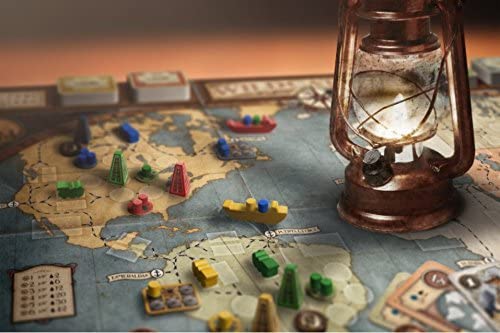
Wildcatters is a tactical and strategic board game set during the booming business of the 19th century oil industry!
Players develop oil fields, bid for oil rights, and build oil refineries, rigs, tankers, trains, and refineries. The objective is to deliver more oil barrels to the continents than the other players while collecting more shares and money.
There are seven rounds of play for four players, and each player gets the same board setup: three oil rigs, two trains, one tanker and one refinery. There are eight areas where you can find oil on the game board. After choosing an open area card, players get money to build rigs, tanks, trains and refineries, then they can buy oil actions. In an oilfield, players collaborate to find oil at a lower cost. All players transport oil to refineries together, using trains and tankers from other players – all to deliver more oil than the other players by the end of the game.
Find out moreRace for the Galaxy
Suitable for 2 – 4 players | 30 – 59 mins duration | Recommended age 12+ | Game complexity: MEDIUM
Genre: Card Games,Civilization,Economic,Science Fiction,Space Exploration Solo game mode: No Co-op: No
Online Version: Yes
No products found.
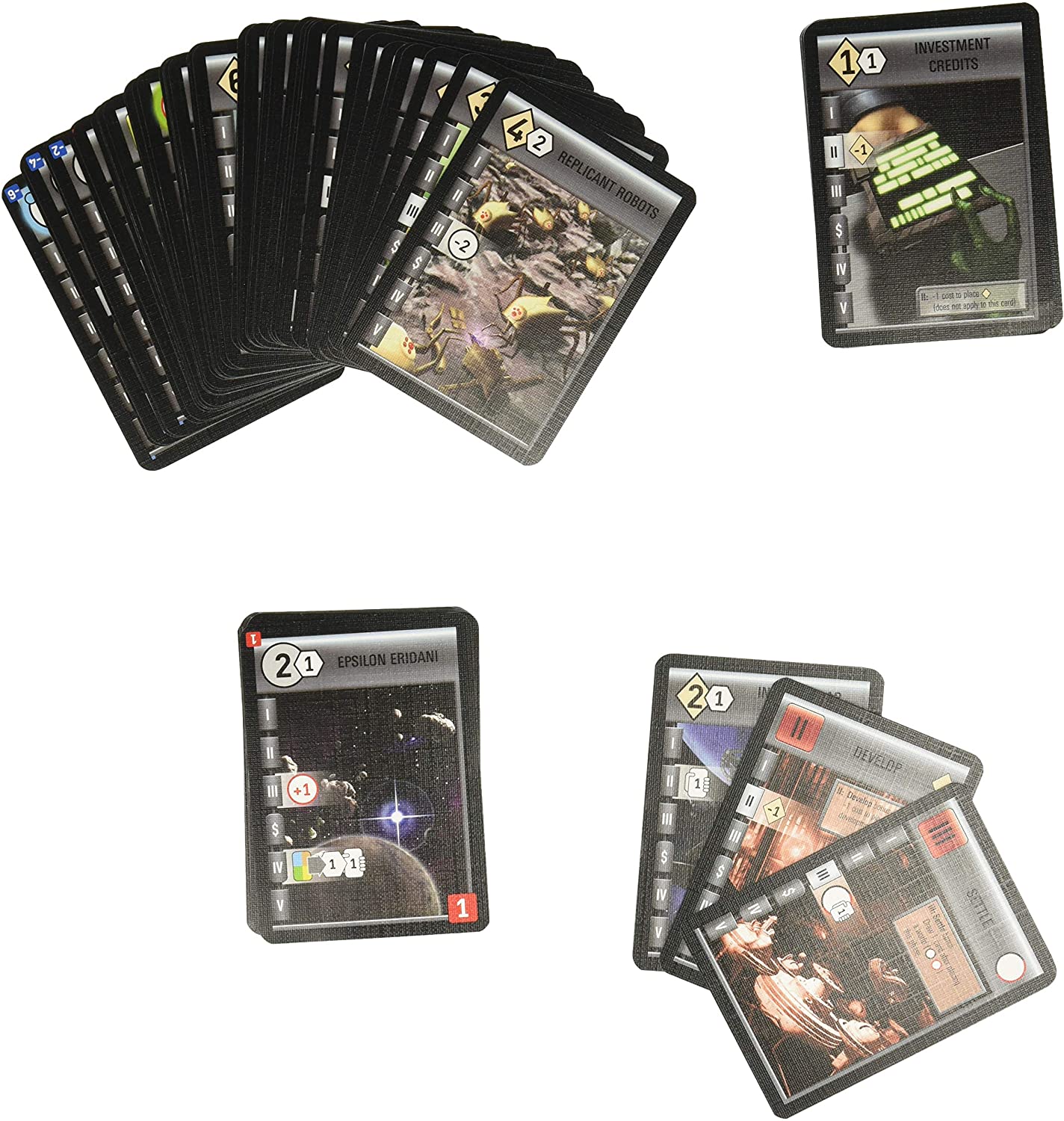
Race for the Galaxy is a 2-4 player card game where players build intergalactic civilizations. Players use game cards to represent worlds or technical and social developments with some worlds enabling players to produce goods to gain card draws or victory points when utilized with the appropriate technologies.
At the commencement of each round, players select, secretly and simultaneously, one of the seven roles associated to the phases in which the round progresses, activating that phase for the round and giving players the opportunity to perform the phase’s actions.
The player with the highest total of Victory Points wins the game.
Find out moreKanban: Driver’s Edition
Suitable for 2 – 4 players | 90 – 120 mins duration | Recommended age 12+ | Game complexity: EASY
Genre: Economic,Industry Solo game mode: No Co-op: No
Online Version: No
No products found.
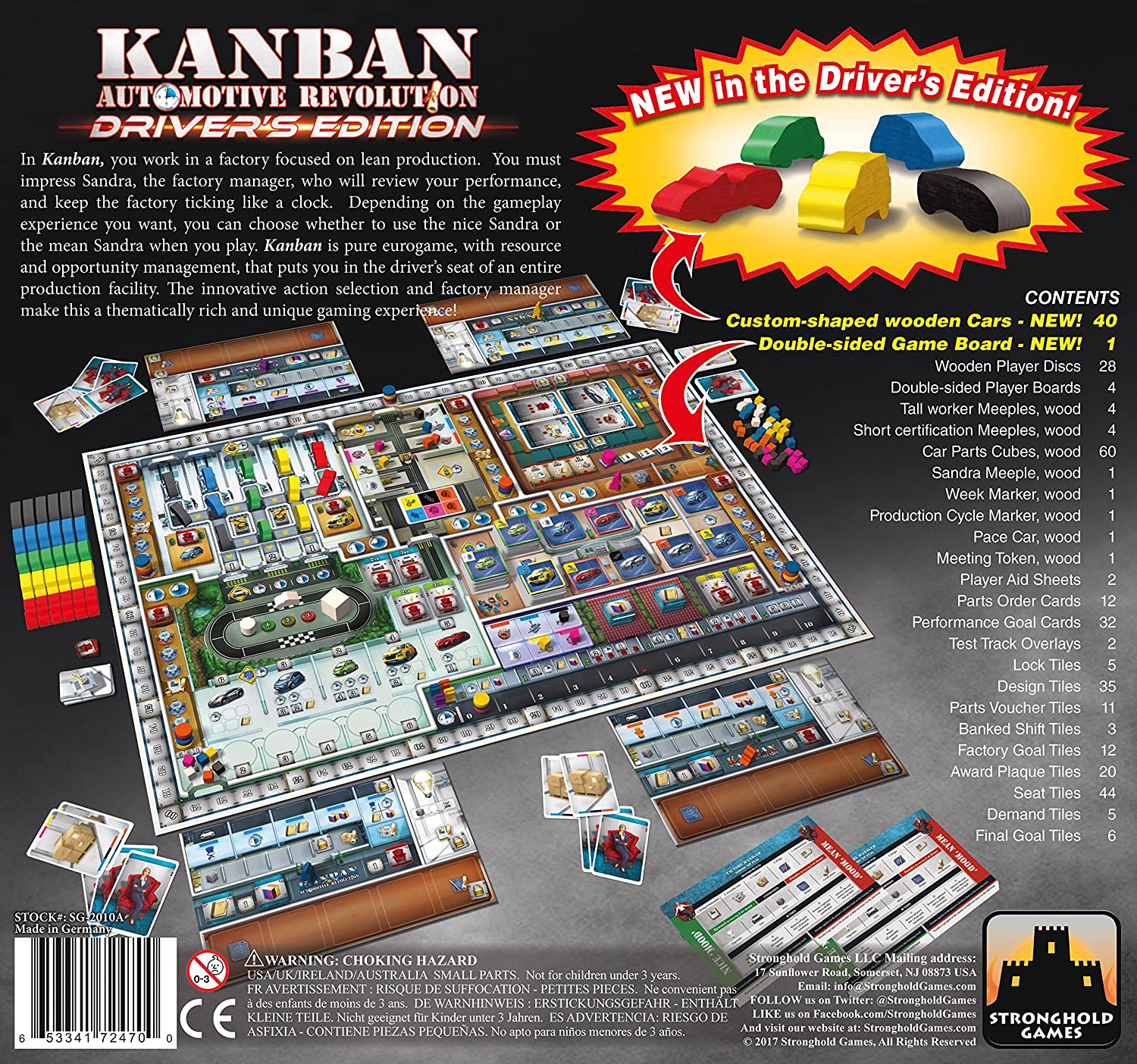
Kanban is set in an assembly line. Players are ambitious managers who attempt to impress the board of directors in order to achieve the highest position possible in the company and secure their careers. Through solid management, players must strive to shine next to their peers, with promotions offering advantages at the factory as well as more storage for precious materials. Managing suppliers and suppliers, improving automobile parts and innovating are some things that players need to do to succeed.
Find out moreLe Havre
Suitable for 1 – 5 players | 30 – 150 mins duration | Recommended age 12+ | Game complexity: EASY
Genre: City Building,Economic,Industry,Nautical Solo game mode: Yes Co-op: No
Online Version: No
Click here for the official rulebook
No products found.
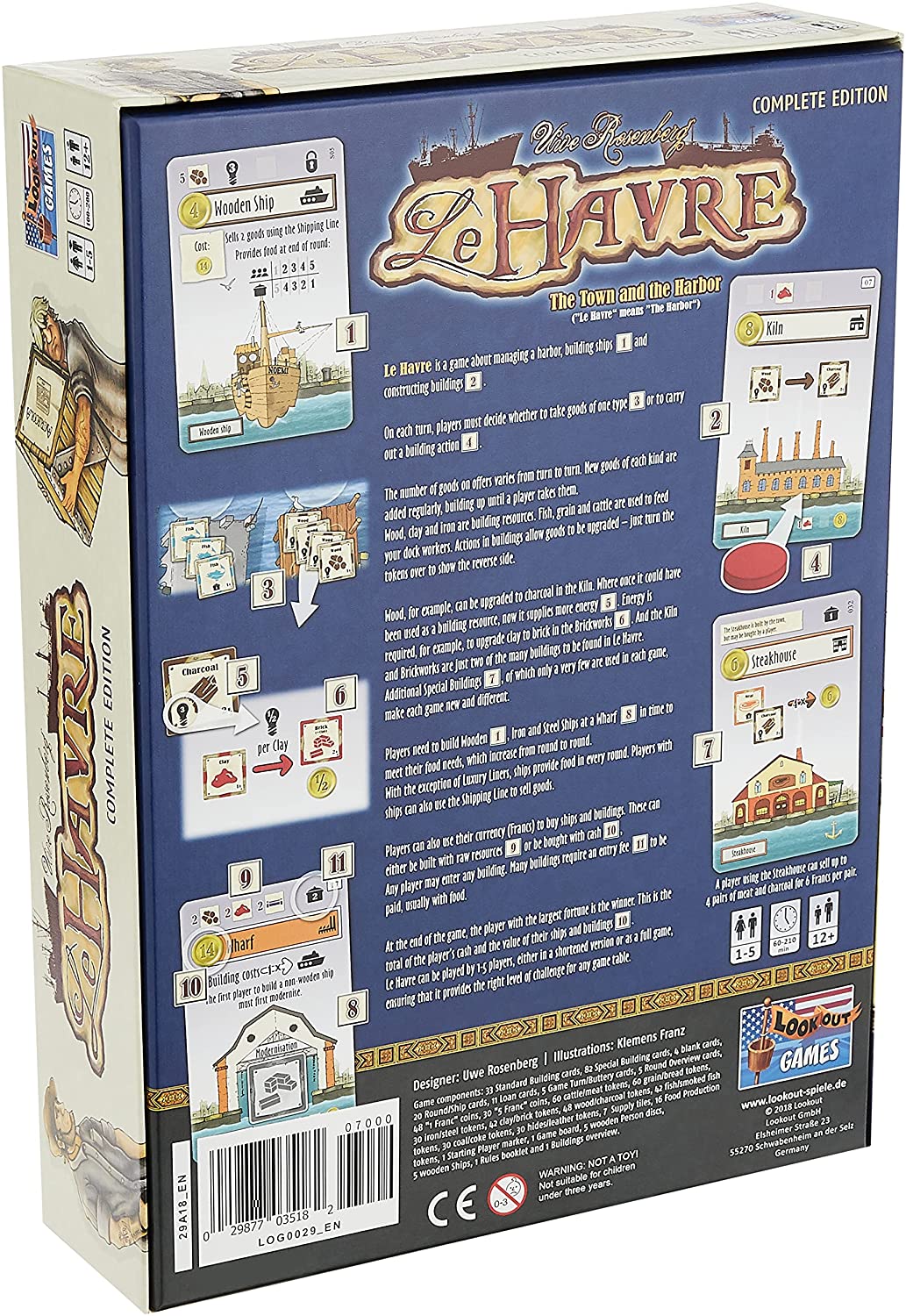
Le Havre is a French city containing France’s second largest harbour. This game has a simple principle. The turn of a player consists of two steps: Distribution of newly supplied goods onto the Offer spaces; then action. As an action, players have the choice either to take all goods of a type from an Offer space or to use one of the buildings. Players can upgrade goods, sell them or build their own buildings and ships using building actions. A building is both an investment opportunity and a revenue stream as players must pay an entry fee to use a building they do not own. On the other hand, ships are primarily used for providing workers with food.
A Harvest increases players’ grain and cattle reserves, and they must feed their workers every seven turns. Each player may perform one final action after a fixed number of rounds. Players add the value of their buildings and ships to their cash reserves. Whoever has the largest fortune wins.
Find out moreTerraforming Mars
Suitable for 1 – 5 players | 110 – 130 mins duration | Recommended age 12+ | Game complexity: MEDIUM
Genre: Economic,Environmental,Industry,Science Fiction,Space Exploration,Territory Building Solo game mode: Yes Co-op: No
Online Version: No
No products found.
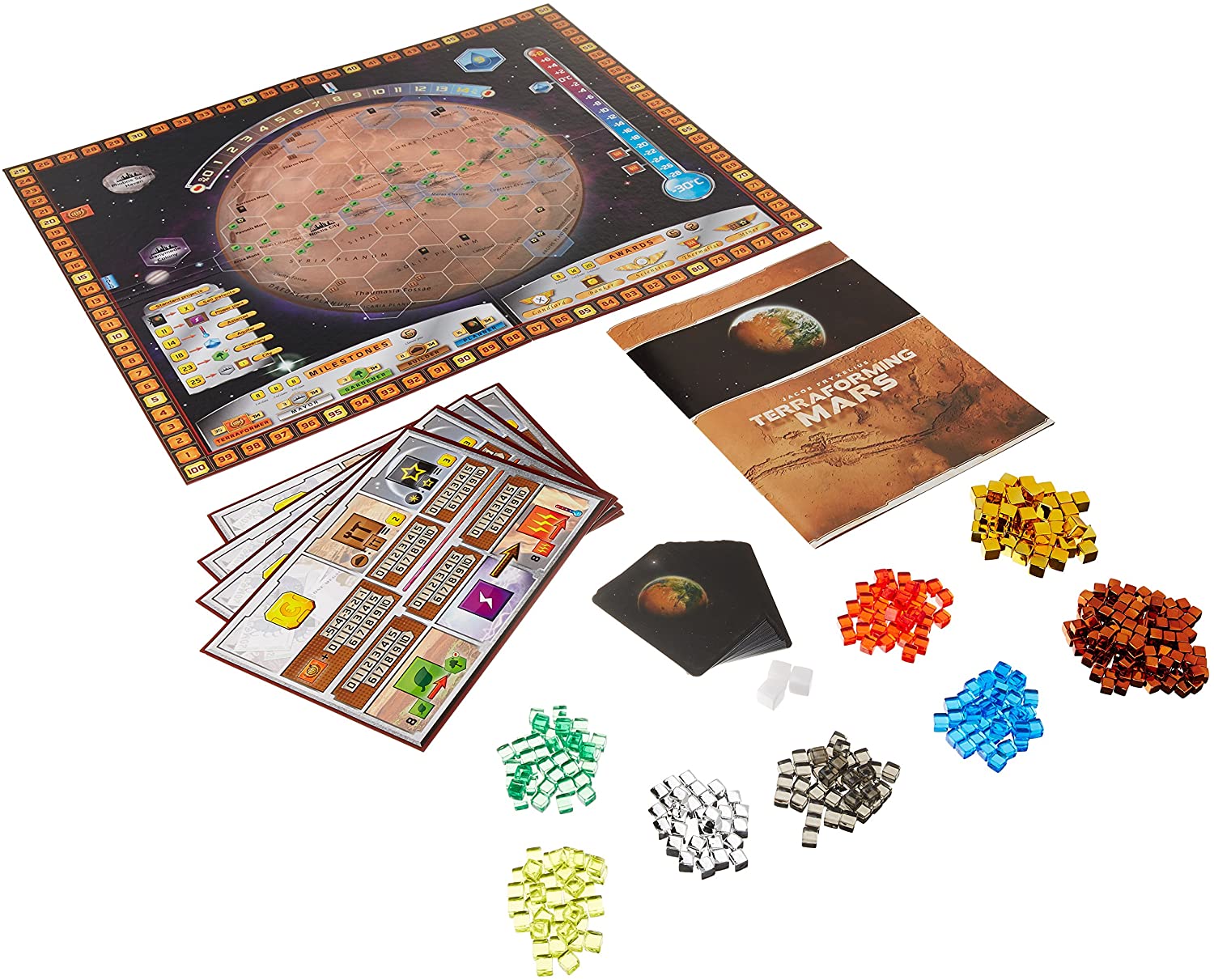
If you’re a fan of strategy games and space exploration, Terraforming Mars will likely grab your attention. The game revolves around terraforming the red planet – Mars! Players take on the role of corporations competing to make Mars a suitable habitat for human life.
Game Mechanics
The game is played on a board representing Mars, divided into several hexagonal tiles that represent different areas such as oceans, forests, and cities. Players have a hand of cards that represent various projects, actions, and resources, which they can use to increase their production or terraforming rating.
The game is played in generations, with each generation consisting of several rounds where players take turns performing actions. The ultimate goal is to achieve the highest terraforming rating by increasing oxygen levels, raising temperature, and placing oceans on the planet’s surface.
Who Might Like this Game?
Terraforming Mars is a perfect fit for anyone who loves strategy games. It requires strategic planning, resource management, and adapting to changing circumstances, making it entertaining for both casual and experienced gamers.
But, what sets this game apart from other strategy games is its theme. The idea of colonizing Mars is fascinating, and this game does an excellent job of immersing players in the experience. It’s a great way to satisfy our curiosity about space exploration while also having fun.
What Makes it Fun?
Apart from its captivating theme, Terraforming Mars has many other elements that make it enjoyable. The game is highly replayable due to its countless strategies and combinations of cards that keep each playthrough fresh and exciting. The game also offers a satisfying sense of progression as players see their efforts pay off in the form of a more habitable Mars.
Find out moreTroyes
Suitable for 1 – 4 players | 85 – 95 mins duration | Recommended age 12+ | Game complexity: MEDIUM
Genre: Dice,Economic,Medieval Solo game mode: Yes Co-op: No
Online Version: No
Click here for the official rulebook
No products found.
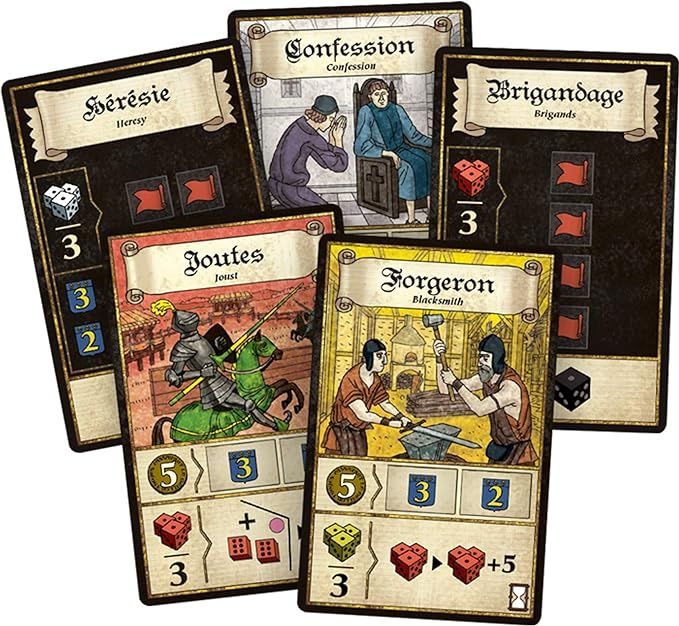
Troyes: A Strategy Game Masterpiece for the Tactical Thinker
Troyes immerses you into the vivid tapestry of the medieval era. It is set in the thriving Champagne region of France, and a battleground where you exercise wit, resourcefulness, and political maneuvering to rise above your peers.
The Setting: A Veritable Slice of Medieval Life
Troyes presents a rich historical backdrop where players become the leaders of influential families aiming to improve their social standing through various means, such as building the cathedral, increasing their workforce, or engaging in military affairs. The intrigue lies not only in the strategic decisions players make but also in the dynamic societies they shape. The game is as much about building a legacy for your lineage as it is about outmaneuvering your opponents.
The Gameplay: Constructing Your Legacy
The core of Troyes is resource management and maximizing their conversion into valuable commodities, services, and influence. The basics of the gameplay are as follows:
Character Cards and Dice: Each player has a set of dice, which represent their workforce and are used to perform actions. There are various character cards available, each providing unique abilities and bonuses, which can be acquired throughout the game.
The Action Board: Here, players can take a variety of actions, from acquiring and using resources to engaging in building projects or hiring characters for future rounds. The board is divided into four different quadrants, representing areas of influence and skill development.
The Event Die: Troyes keeps players on their toes with the Event Die, which can trigger both positive and adverse effects based on the drawn card.
The Cathedral: One of the game’s central features, the construction of the cathedral, bestows prestige and power on those who invest in its completion.
Players use their dice to bid, hire citizens with unique abilities, and fend off adversity from criminals and armadas. The strategic complexity expands as players learn the intricacies of combining dice, characters, and actions.
Mechanic Mastery: Balancing Skill and Luck
Troyes doesn’t shy away from incorporating randomness into the game, but skillful players can mitigate bad rolls and turn them to their advantage. This mechanic keeps the game dynamic and prevents predictability, ensuring that no two playthroughs are exactly the same. The beauty of Troyes lies in the fine balance it strikes between controlled strategies and the excitement of chance.
The implementation of dice as both a resource and a tool for action and the plethora of character abilities and actions available ensure that every decision comes loaded with possibilities and multiple outcomes. Players who can adapt on the fly and make the most of unexpected opportunities find themselves at a significant advantage.
Strategic Depth: Long-Term Plan vs. Immediate Gain
Troyes rewards players who think ahead, manage their resources wisely, and execute a long-term plan with precision. The decisions you make early in the game can have far-reaching consequences. Will you invest in the cathedral foundation, securing future wealth and prestige, or train more citizens to bolster your defenses against potential threats?
There’s a delightful tension between short-term gain and long-term payoff. Do you spend your limited actions and dice to buy powerful characters, or do you build up a strong workforce to take multiple actions in the future? This balancing act keeps players engrossed in the strategic puzzle that is Troyes.
The Personal Touch: Unique Experience for Every Player
One of the endearing qualities of Troyes is the room it provides for personal play styles to shape the game. Each player’s board will look different not just because of the random setups and character draws but because of the perceivable strategies at play. If you have a penchant for military might, you might choose to aid your city’s defense against mounting threats. Alternatively, a focus on the ecclesiastical route may see you achieving greatness through the power of faith and community.
Every game session feels uniquely personal as players craft their individual narratives. The game offers a sense of agency as players get to tailor their approach without straying too far from the core of the game’s mechanics and objectives.
Why Gamers Love It: A Tapestry Woven with Greatness
The allure of Troyes is found in its numerous strategic paths and the satisfaction of successfully navigating them. The game’s intricate design ensures that there are multiple routes to victory, with no ‘right’ or ‘wrong’ way to play. It invites players to think critically, plan meticulously, and adapt fluidly to the challenges presented.
An Invitation for the Curious: Who Should Play?
Troyes appeals to those who enjoy deep, strategic gameplay with high replay value and don’t shy away from a challenge. It’s a perfect fit for those who revel in the satisfaction of learning a complex system and watching their understanding and skills grow with each session.
Playing Troyes is an experience that combines the best of Euro-style mechanism and thematic immersion. Gain the satisfaction of mitigating dice luck through clever actions as well as the thrill of a hard-earned victory.
It’s a game of depth and substance, one that will see countless hours of play as you explore its nuances and challenge the strongest of gaming groups. If you seek a game that offers a rewarding intellectual engagement, where every decision holds weight and consequences, then give Troyes a place at your gaming table.
Find out more